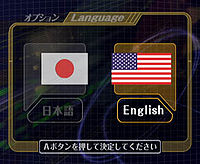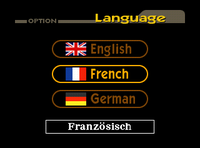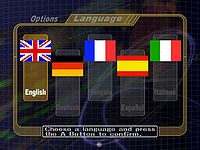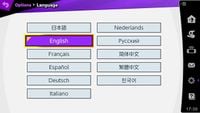Language: Difference between revisions
(→In Super Smash Bros. 4: It's the same version in Europe and Australia) |
|||
| Line 72: | Line 72: | ||
===PAL region version=== | ===PAL region version=== | ||
<!--NTSC/PAL are not applicable to 3DS/Wii U, so this is the "PAL region version", not the "PAL version". It is not correct to call it the "European version" or the "European and Australian versions", since the same version is used in both Europe and Australia--> | |||
The {{s|wikipedia|PAL region}} version of both the Nintendo 3DS and Wii U versions support English, French, Spanish, German, Italian, Dutch, Portuguese, and Russian. The language used by the game depends on the language set on the system itself, and cannot be changed in-game. | The {{s|wikipedia|PAL region}} version of both the Nintendo 3DS and Wii U versions support English, French, Spanish, German, Italian, Dutch, Portuguese, and Russian. The language used by the game depends on the language set on the system itself, and cannot be changed in-game. | ||
Revision as of 00:13, April 28, 2019
Language is an option found in the Options menu on the PAL versions of Super Smash Bros. and Super Smash Bros. Brawl, all versions of Super Smash Bros. Melee and Super Smash Bros. Ultimate, and determined by system settings in the NTSC versions of Brawl and all versions of Super Smash Bros. 4. As the name suggests, the player can adjust the language of their copy of the game.
In Super Smash Bros.
The original Super Smash Bros. is available in Japanese, English, French, German, and Simplified Chinese.
Language can only be adjusted in the European PAL version of SSB (uniquely, SSB has separate European and Australian PAL versions). The language can be set to English, French, or German through an extra section on the options menu. When the player hovers over a menu item with the language set to either French or German, a white box with its corresponding translation will display at the bottom of the screen. The announcer is dubbed in both languages; however, the German version does not have unique voice clips for "Captain Falcon" or "Team Battle", using the English clips instead.
The Simplified Chinese version of the game is only available on the iQue Player, the Chinese export of the Nintendo 64. While the game is fully translated, almost all voice acting is reused from the English version of the game. The non-playable Pokémon, however, receive new voice clips.
In Super Smash Bros. Melee
Super Smash Bros. Melee is available in Japanese, English, French, Spanish, German, and Italian. Spanish and Italian are new to the series, while Simplified Chinese is no longer available, likely due to the game never being officially released in mainland China.
NTSC versions
In the NTSC versions of Melee, the player can switch between Japanese and American English for their languages. Changing the languages has little to no effect on actual gameplay; almost all changes in the game are cosmetic when languages are switched.
Interestingly, when the English language setting is active, the "Language" option is written in Japanese. The opposite occurs if Japanese is set as the language instead.
List of differences in the Japanese version versus the American English version
- Bowser and Jigglypuff are given their Japanese names of "Koopa" and "Purin" in Japanese. All Pokémon, when released, will also say their original names depending on the version.
- The Ice Climbers have a caption of "Ice Climber", in the singular; in addition, the announcer refers to them as "Ice Climber" as well.
- Donkey Kong's caption in Japanese in spelled as "D.Kong"; in English, Donkey Kong's caption is "DK".
- The Collection mode will change depending on the language; a list of differences can be seen in the Collection article.
- Trophies will display what console the game was released for in Japanese; this indication doesn't appear in American English. Trophies are also referred to as "Figurines" in Japanese.
- Characters may or may not speak depending on the language. In American English, neither Falco nor Mewtwo speak, but in Japanese, the two speak in full sentences in some cases.
- The camera angle in the Home-Run Contest is more zoomed-in when the language is set to Japanese.
- All distances in the game are recorded in feet in American English, due to America's use of the U.S. Imperial System. All distances are recorded in metres in Japanese, as Japan uses the metric system.
- The latter is also the case with PAL versions.
- The announcer says different phrases in some of the game modes, which are covered in the respective article.
- Crowd chants are different in Japanese than they are in American English.
- The Sound Test features two kanji characters in place of the discs when set to Japanese; these characters also spin when music is played.
- There are various cosmetic changes to the menus. On the Character select screen, for instance, when set to Japanese, the "Ready to Fight!" banner says "Press Start/Pause", while in American English, it will simply say "Press Start".
- The lottery, in Japanese, will say "Get!" and "New Figure". In English, these messages will be replaced by "Got it!" and "A new trophy!" In addition, the Lottery also has a green "A" above the lever when the game is set to Japanese.
- The Motion-Sensor Bomb from Goldeneye 007 reverts to its appearance in Perfect Dark as in the Japanese release of Melee, both in-game and its trophy. However, its origin is still listed as "TOP SECRET", while the actual Japanese release of Melee properly credits it to Perfect Dark.
- The Topi trophy does not change to a seal if the language is set to Japanese on an American copy of the game.
PAL versions
In PAL versions of Melee, the player can choose between five different languages in the game, reflecting the multiple areas of the European Union. They are:
- English
- German
- French
- Spanish
- Italian
The quality of the European localization is questionable; while most of the "simple" text is translated, a majority of the game's text, notably of game modes and menu options, remain in English. Furthermore, despite the presence of the British flag on the English option, the text is unchanged compared to the NTSC's English language setting, and does not take into account for regional differences, such as the use of "color" over "colour". Additionally, the announcer voice clips are reused from English (other than Jigglypuff's foreign names, resulting in a disparity between voices).
Similar to the NTSC version, changing the language causes some minor changes in the game.
In Super Smash Bros. Brawl
Super Smash Bros. Brawl is available in Japanese, English, French, Spanish, German, Italian, and Korean. Korean is new to the series.
NTSC versions
Players no longer have the option to choose between Japanese and American English in Brawl.
PAL versions
In PAL versions of Brawl, the player can choose between five different languages, like in Melee. The choices remain the same, and like before, aspects of the game can change. However, the language cannot be changed in-game, as the language for Wii games is decided based on what language the console is set to.
Compared to Melee, all text is translated to the language of choice, and the announcer is fully dubbed into each language.
In Super Smash Bros. 4
Both versions of Super Smash Bros. 4 are available in Japanese, English, French, Spanish, German, Italian, Dutch, Portuguese, and Russian. Dutch, Portuguese, and Russian were new to the series. While Super Smash Bros. for Nintendo 3DS is available in Korean, Super Smash Bros. for Wii U lacks the option, because the Wii U console was never officially released in South Korea. Additionally, the Korean version borrows the announcer's voice clips from the Japanese version of the game, rather than recording new Korean voice clips.
American version
The American version of both the Nintendo 3DS and Wii U versions support English, French, and Spanish. The language used by the game depends on the language set on the system itself, and cannot be changed in-game.
PAL region version
The PAL region version of both the Nintendo 3DS and Wii U versions support English, French, Spanish, German, Italian, Dutch, Portuguese, and Russian. The language used by the game depends on the language set on the system itself, and cannot be changed in-game.
While the five languages from Melee and Brawl continue to localize the announcer and a small number of character voices, the three new languages (Dutch, Portuguese and Russian) borrow their voice clips from the English language version.
In Super Smash Bros. Ultimate
Ultimate supports 11 languages regardless of region: Japanese, English, French, Spanish, German, Italian, Dutch, Russian, Korean, Simplified Chinese, and Traditional Chinese. Simplified Chinese is available for the first time since the original Super Smash Bros., and Traditional Chinese is entirely new to the series. However, Portuguese, which was present in Smash 4, is no longer available. For characters who are only voiced in English and Japanese, Asian language localizations use the Japanese voices, whereas Western language localizations use the English voices. As in previous titles, a small number of characters are also voiced in French, Spanish, German and Italian.
The English/Japanese announcer, Xander Mobus, serves as the Korean announcer, while a mixture of his voice clips from both the English and Japanese versions are reused for both Chinese languages. New announcers also provide voice clips for the Dutch and Russian languages.
For the first time since Melee, language selection is available from an in-game menu rather than being automatically selected based on the system's region and language settings. Some regional differences are still present, such as the name "Duck Hunt Duo" for Duck Hunt in British English, while other former differences such as Boxing Ring character titles and American vs. Commonwealth spelling have been standardized between regional versions.
English, French, and Spanish have two different variants: an American variant (American English, Canadian French and Latin American Spanish) and a European variant (British English, European French and Castilian Spanish). Which version of the language is used depends on the Nintendo Switch's region. A Nintendo Switch whose region is set to "The Americas" will use the American versions, whereas a system whose region is set to "Europe" or "Australia/New Zealand" will use the European versions. This effectively gives Ultimate a total of 14 language choices compared to the 11 selectable in the menu.
Unlike previous games, changing language settings in Ultimate reboots the game. As such, changing the language is used by various players as an alternate method (besides closing and reopening the game) to unlock characters in Smash battles more quickly by bypassing the 10-minute cooldown timer between challengers, particularly when using controllers that lack a HOME button.
Trivia
- The Asian and North American versions of Super Smash Bros. and Brawl are the only games that possess a singular language option.
- In non-English Western language versions of Brawl and SSB4, most characters retain their voices from the English version, with English or Japanese dialogue where applicable. Exceptions include most Pokémon characters (apart from Pikachu, Charizard, Mewtwo and a few Poké Ball Pokémon), the Wii Fit Trainers, and Sonic (in SSB4 onwards). This is due to the Pokémon anime and spinoff games, the Wii Fit series, and Sonic games (from Sonic Generations onwards) being dubbed into many languages, while the other represented series are either unvoiced or retain the English voices with translated text and subtitles. However, Fox, Falco and Ike still speak English, even though Star Fox 64 3D and Fire Emblem: Radiant Dawn were dubbed into multiple languages, and Cloud speaks Japanese even though most of his home series appearances were dubbed into English (with some dubbed in additional languages).
- In Ultimate, this holds true for the above characters along with Zelda and Wolf, who speak English in all Western language versions of the game despite their incarnations from The Legend of Zelda: Breath of the Wild and Star Fox 64 3D respectively being voiced in multiple languages, and Wario, who speaks one word of English ("Yes!") in any version of the game even though he was also voiced in several languages in WarioWare Gold.
- In tournament play, some tournaments in non-English-speaking regions choose to set the game to English rather than the regional language, presumably due to English being the standard game language setting in national tournaments. For example, the "Master Hand" Melee tournament series in Japan uses the game's English language option.
- Bowser, Bowser Jr., Rosalina & Luma, Piranha Plant, Sheik, King Dedede, Jigglypuff, Mewtwo, Squirtle, Ivysaur, Charizard, Greninja, Incineroar, Robin, Corrin, R.O.B., Dark Pit, Isabelle, Duck Hunt and Mega Man are the only playable characters to have their proper names changed in another language.
- Others with a name change just translate titles or descriptors (like Captain Falcon), and/or have it specified for gender (like Wii Fit Trainer). Palutena is a unique case in French localizations; her name only differs in the addition of an acute accent, but it is treated as an alternate name on her NTSC amiibo packaging.
- SSB4 Pokémon amiibo Jigglypuff, Charizard and Greninja do not have their French names displayed on their American packaging (even when reprinted for Ultimate), although they are present on their European packaging. However, Ultimate Pokémon amiibo (Squirtle and Ivysaur) have their French and Japanese names displayed on their American packaging.
| Super Smash Bros. menu items | |
|---|---|
| VS Mode | VS Start (Team Battle) · Rule · Time / Stock · VS Options |
| 1P Mode | 1P Game · Training Mode · Bonus 1 Practice · Bonus 2 Practice |
| Option | Sound · Screen Adjust · Backup Clear |
| Data | Characters · VS Record · Sound Test |
| Unused | Debug menu |
| Super Smash Bros. Melee menu items | |
|---|---|
| Vs. Mode | Melee (Time · Stock · Coin Battle · Bonus · Team Battle) · Custom Rules · Special Melee · Tournament Mode · Names |
| 1-P Mode | Regular Match (Classic Mode · All-Star Mode · Adventure Mode) · Event Match · Stadium (Target Test · Home-Run Contest · Multi-Man Melee) · Training |
| Trophies | Gallery · Collection · Lottery |
| Options | Rumble · Sound · Screen Display · Language · Erase Data |
| Data | Snapshots · Melee Records · Sound Test · Archives (NTSC only) · How to Play (PAL only) |
| Unused | Debug menu · Debug sound test menu |




